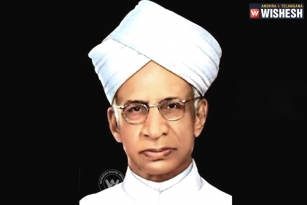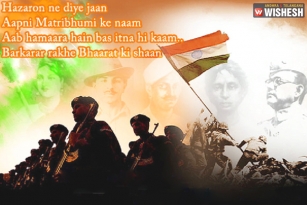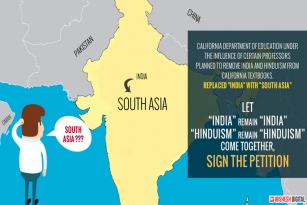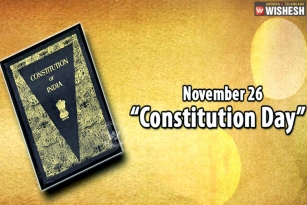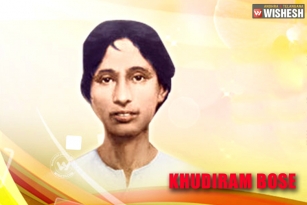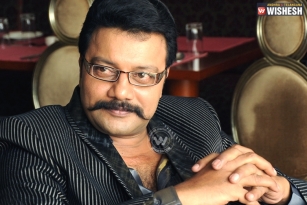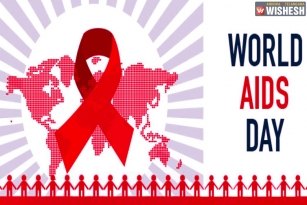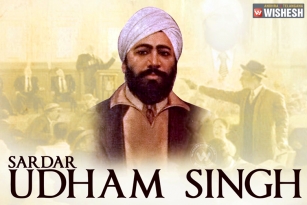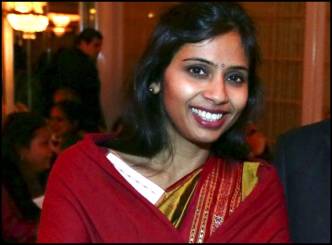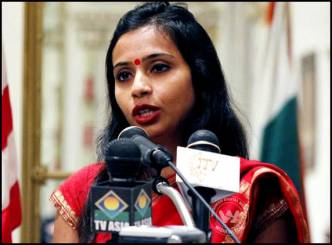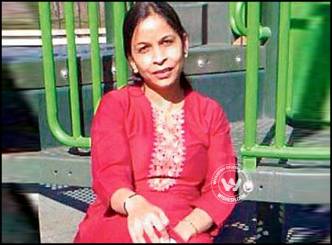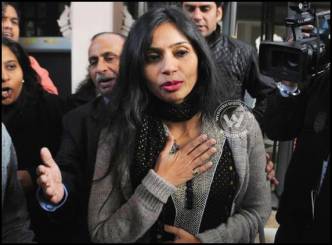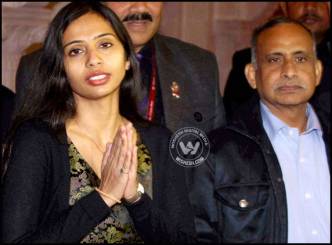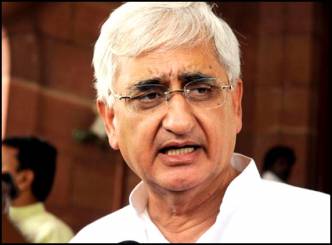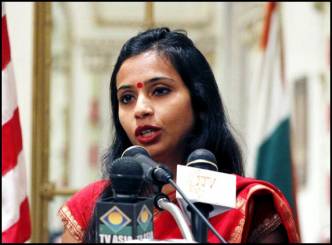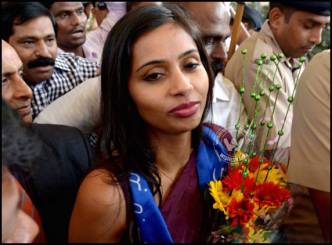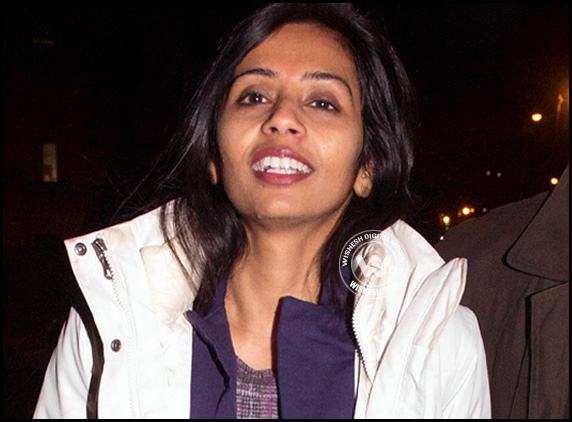
Devyani Khobragade's arrest on December 12, 2013 on charges of visa fraud by United States has led to a diplomatic impasse between India and the US. There has been uproar in India over her ill-treatment and the political community has asked for her charges to be dropped. The US has been unrelenting so far. 39-year-old Khobragade was posted at India's deputy consul general in the Consulate General of India in New York at the time of her arrest.
Wishesh is trying to unravel the puzzle of the Devyani Khobragade case. The previous two parts tried to understand the story from both the angles - Devyani as well as Sangeeta Richard. But in this high-profile case involving a diplomat and her maid, who is the real victim? Read on to decide for yourself.
Khobragade was arrested when she had gone to drop her kids to school by U.S. Department of State Police and the United States Marshal Service. She was handcuffed upon arrest and later went through strip search and cavity search like hardcore criminals. Later the mid-level Indian diplomat was kept in a cell with drug addicts. The whole episode led to uproar in India, and a diplomatic tangle between India and the US.
The next day on December 13, 2013, the 1999-batch IFS officer was released on a bond of $250,000 after she pleaded not guilty in court.
Preet Bharara, US Attorney for the Southern District of New York stated that she was not handcuffed (before her kids) and was treated with courtesy. The question arises as to why Khobragade was arrested the way she was, why she was not sent summons or arrested when she was at home. Why was she arrested like a hardcore-criminal-on-the-run? What was the need to make a big public show of the whole episode?
The tough-speaking US Attorney Preet Bharara has stirred-up a hornet's nest by making an example of deputy counsel Khobragade in New York. Indian born Bharara was brought up in New Jersey. The “extremely public nature” of Khobragade’s arrest has been reportedly linked to Bharara’s political ambitions (indiatoday.intoday.in/story- Toronto Dec 18, 2013). According to reports in the Daily Mail, an Indian official said that Khobragade is not the first diplomat from a developing nation involved in fudging of salary figures of her domestic help, nor would she be the last. (firstpost.com/world - Dec 19, 2013). Diplomats from many nations bring their staff from their home countries and pay them wages that Indian diplomats pay, he added, so why has an Indian diplomat been targeted. According to a British newspaper, Bharara has been targeting people of Indian origin and the fact has been noticed by Indian officials in South Block. The high-profile conviction secured by Bharara’s office include former Goldman Sachs director Rajat Gupta for insider trading, former McKinsey senior executive Anil Kumar in the Rajaratnam case and Rajiv Goel from Intel Capital.
Devyani Khobragade if guilty of visa fraud is definitely wrong about not paying the amount stated or the long hours she made her maid work (even if technically 19 hrs seems impossible). But was the US right in the way she was treated? Could she not have been arrested at home? Could it not be settled (like it is generally done) by paying the amount that was obligatory to Sangeeta Richard?
Maybe her arrest was meant to send a strong message that such negligence of US laws would not be tolerated. It's imperative to state here that in 2012, Neena Malhotra, a diplomat at the Indian Consulate, was asked to pay almost $1.5 million for employing an Indian girl, Shanti Gurung, who worked without pay and was treated inhumanly.
More recently (wsj.com - Oct. 30, 2013), Infosys agreed to pay a hefty penalty of $34 million for alleged immigration violations while at the same time it denied to have committed visa fraud. On Oct. 30, 2013 the Indian IT giant agreed to pay the penalty to settle the civil case, according to the U.S. attorney's office in Texas' Eastern district. The company agreed that there had been mistakes in filing I-9 forms meant for federal employment-verification records. The federal prosecutors and investigators in the Infosys case revealed that the company was sending its employees to the US on B-1 visas instead of H-1B visas. H-1B visa costs about $5,000 per worker and takes a long time (months) in processing in the US. But a B-1 visa only costs $160 and is easily obtained within few days at any US Consular office abroad. But B-1 visa does not provide work permit, it only allows the employers to attend meetings or discussions.
So why was such a negotiation not done with Khobragade? Why did the US State Department not communicate with its Indian counterpart at the highest level to deal with the issue as it is clear that Khobragade's visa fraud case was not the lone case in this category. Ofcourse there is more than what seems the obvious.
On December 18, 2013 Khobragade was transferred to India's UN mission in New York for extending full diplomatic immunity to her, thereby providing complete protection from prosecution.
At the time of arrest Khobragade was posted as India's deputy consul general at the Consulate General of India in New York. The post entitles her to only consular immunity. Khobragade also got exemption from personal appearance in the hearing of visa fraud charges in a New York Court. She was also extended accreditation to the UN headquarters.
However, recently reports have revealed that Devyani had full immunity from personal arrest or detention at the time of her arrest on Dec 12, 2013. The Indian diplomat was accredited an advisor to the Permanent Mission of India to the UN until December 31, allowing her immunity from arrest (indiatimes.com/2013-12-27/india). So it seems that Preet Bharara may have hampered Indo-US relations without taking full cognizance of the Devyani Khobragade case.
Meanwhile, following the harsh treatment of Khobragade New Delhi's made two demands- one, withdrawal of charges against Devyani Khobragade and two, to apologize for the alleged harsh treatment. The US said it regretted harsh treatment but on the two demands the US was not compromising. It ruled out dropping of charges or an apology.
The diplomatic impasse led to the government of India withdrawing special privileges extended to US diplomats and their families while in India. The US diplomats were asked to surrender their special passes by December 20 following which they couldn't avail special treatment at airports. Besides, the US embassy in India was asked to furnish a list of all Indian nationals working in the US consulates that included domestic servants, by December 23. They were also asked to provide copies of their contracts, PAN numbers, bank accounts and salaries. Besides, US embassy's import clearances for liquor were also stopped. Indian Government has removed traffic barricades on Nyaya Marg near the US embassy.
Recently, the Indian government has stepped up pressure on US government to drop charges against the Indian diplomat. Duty-free imports of the US embassy in India may soon be stopped as India has started to question the “commercial activities” taking place there. India has begun to question the concessions given to US embassy. New Delhi is of the opinion that “non-diplomatic personnel” of US embassy, including friends and private firms, are misusing the duty-free import facilities. While giving reasons for its possible move against the “non-reciprocal” concessions, India said that no such privileges was being extended by the US to any other country, as the diplomatic impasse between India and the United States continues.
Stay with Wishesh to know the course of the Devyani Khobragade case and unravel the real victim in this high-profile case.
(AW: Pratima Tigga)
Related Article:- Some Unanswered Questions In Devyani's Story - Part 1
Related Article:- Some Unanswered Questions in Devyani's Case Part-II



